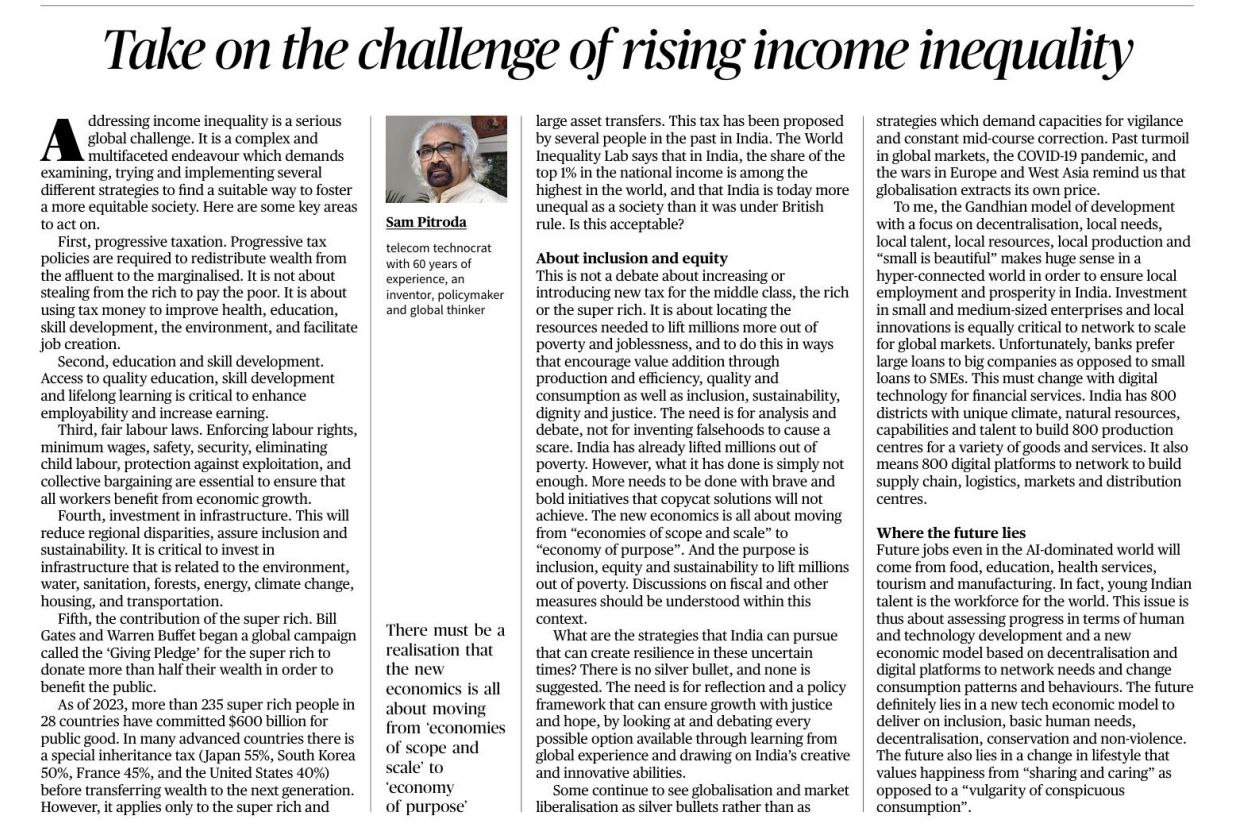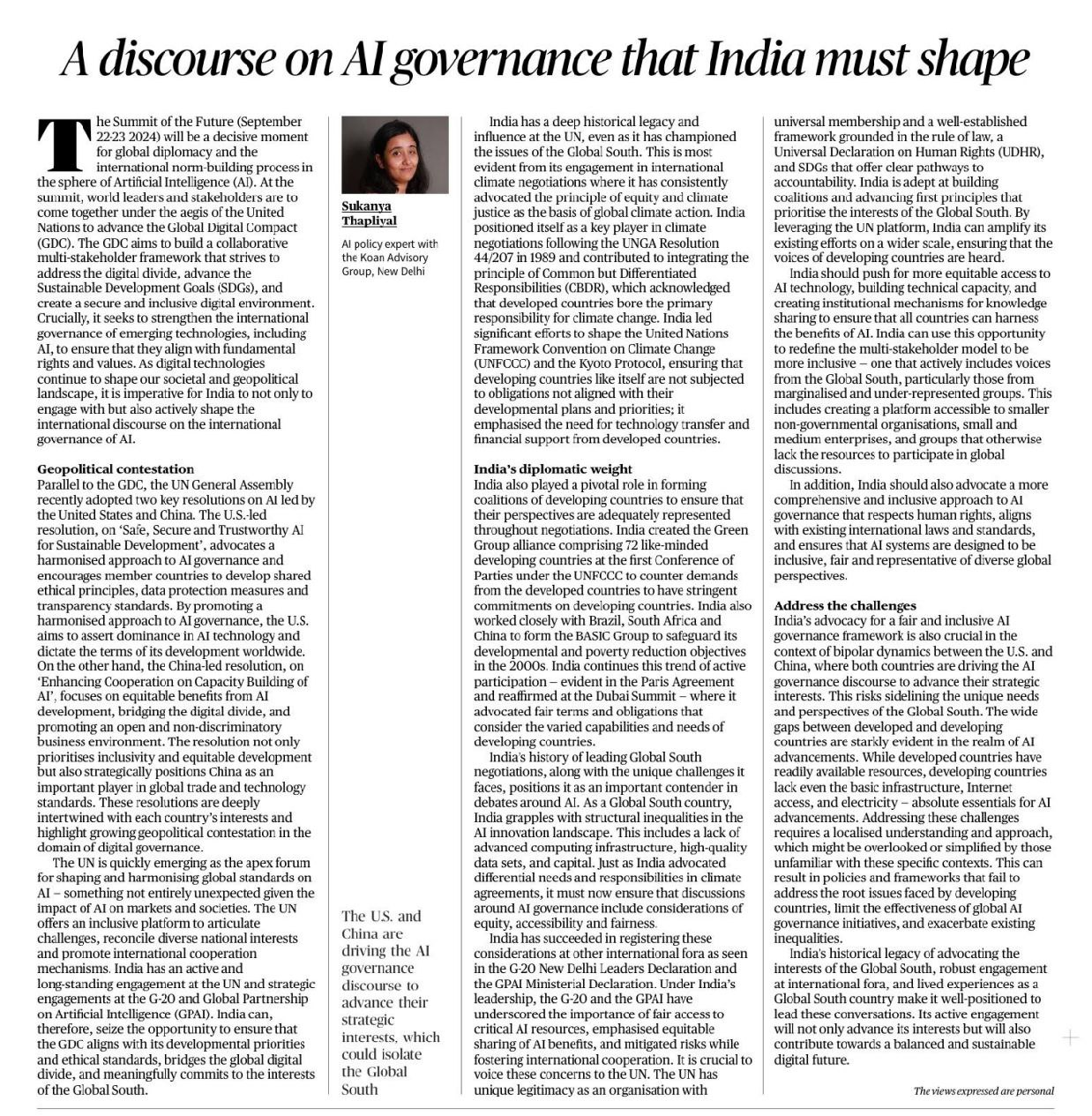1. Rising Income Inequality
Introduction:
Income inequality is a critical global challenge, demanding multi-faceted strategies to foster a more equitable society. Rising income inequality has the potential to weaken social cohesion and disrupt economic stability, making it an issue of both social justice and economic efficiency.
- Progressive Taxation:
- Progressive tax policies aim to redistribute wealth from affluent segments to the marginalized without penalizing wealth creation.
- The World Inequality Lab highlights that India’s wealth concentration is among the highest globally, necessitating effective redistribution mechanisms.
- Education and Skill Development:
- Access to quality education and skills is essential for enhancing employability and increasing earning capacity.
- Lifelong learning and vocational training are key to addressing the needs of an evolving job market.
- Labour Law Reforms:
- Enforcement of fair labour laws, including minimum wages, safety measures, and the elimination of child labour, is crucial.
- Collective bargaining and protection against exploitation ensure workers benefit from economic growth.
- Investment in Infrastructure:
- Infrastructure investments in environmental, water, sanitation, energy, climate change, and transportation sectors are necessary to bridge regional disparities and promote sustainability.
- Contribution of the Super-Rich:
- Philanthropy by the ultra-rich, following global initiatives like Bill Gates’ “Giving Pledge,” can provide essential resources for public welfare.
- Inheritance taxes, which are common in advanced economies, could be a solution for India to fund developmental projects.
- Inclusion and Equity:
- The focus should be on lifting millions out of poverty by promoting economic growth that includes value addition through production, quality, and sustainability.
- The Gandhian model of decentralized development—focusing on local production and resources—makes sense for hyper-connected economies like India.
- Future Vision:
- The AI-dominated future will likely center around sectors such as food, education, healthcare, and tourism.
- Localized economic models, digital platforms, and a focus on decentralization will be critical for sustainable growth.
Conclusion:
Addressing income inequality requires innovative and bold policy initiatives that go beyond traditional solutions. The new economic model must shift from an economy of scale to one of purpose, emphasizing inclusion, equity, and sustainability. With India’s vast talent and unique capabilities, the country can harness these strengths to create a more just and equal society.
Mains Practice Question: |
Q. Discuss the measures India can adopt to reduce rising income inequality in the context of progressive taxation, skill development, and labour reforms. Critically evaluate how the Gandhian model of decentralization can provide a solution in today’s hyper-connected global economy. (250 words) |
2. AI Governance
Introduction:
Artificial Intelligence (AI) governance is emerging as a critical global issue. The upcoming Summit of the Future 2024 will bring together world leaders under the United Nations (UN) to discuss AI governance. India, as a key player in shaping international norms, must actively participate in and influence this discourse to ensure AI development aligns with ethical principles, equity, and the protection of global interests.
- Geopolitical Contestation in AI Governance:
- The United States and China have introduced resolutions in the UN General Assembly related to AI governance.
- S. Resolution: Focuses on developing harmonized global AI principles, promoting safety, security, and transparency.
- China’s Resolution: Advocates capacity building in AI for developing countries, along with equity in digital benefits and addressing biases in AI development.
- The geopolitical divide is stark, with both powers seeking to shape AI governance based on their interests. This contestation emphasizes the need for a neutral, inclusive approach to AI governance, particularly for developing nations.
- The United States and China have introduced resolutions in the UN General Assembly related to AI governance.
- India’s Diplomatic Role:
- India has a rich history of advocating for equity and justice in global governance structures, such as climate change negotiations, by supporting the Common but Differentiated Responsibilities (CBDR)
- In the realm of AI, India has the potential to act as a bridge between developed and developing countries, ensuring the inclusion of perspectives from the Global South.
- India’s active participation in forming coalitions like the BASIC group (Brazil, South Africa, India, and China) in climate negotiations can serve as a model for AI governance negotiations.
- India can help push for technology transfer and capacity-building support for developing countries to harness the full potential of AI.
- India’s Strategic Priorities for AI Governance:
- Ethical AI Development: Ensuring that AI is aligned with principles of equity, fairness, and non-discrimination.
- Inclusion of Developing Countries: India should advocate for a framework that provides access to technology for underrepresented groups, small and medium enterprises (SMEs), and developing economies.
- Sovereignty in AI: India must ensure that developing nations retain autonomy over their AI development agendas without external dominance from AI powers like the U.S. and China.
- Global Partnerships: Leveraging its diplomatic relations, India should engage with like-minded countries to form coalitions advocating for a balanced approach to AI governance, combining technical innovation with social justice.
- India’s Diplomatic Weight in International Negotiations:
- India’s past influence in climate negotiations and its experience in advocating for global justice and equity place it in a strong position to guide AI governance frameworks.
- Its experience in global negotiations can be leveraged to champion policies that protect the interests of developing countries in AI governance, emphasizing capacity building and technology transfer.
Conclusion:
India’s active participation in shaping AI governance is crucial not only for safeguarding its own interests but also for promoting a fair, inclusive, and balanced global AI framework. By advocating for ethical AI, technology transfer, and protection of developing countries, India can play a transformative role in the international governance of AI.
Mains Practice Question:
|
Q. Discuss the significance of global AI governance and the role that India can play in ensuring a fair and equitable framework. What strategic steps should India take to protect the interests of developing countries in AI governance? (250 words)
|



